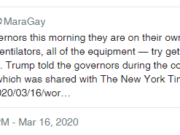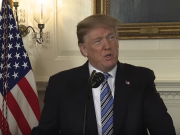National focus is finally on sanctuary cities. That’s a good thing. However, when you build sanctuary cities and sanctuary states, you get sanctuary universities. It is time for the Federal Government to stop the ill-conceived and illegal practice of permitting states and universities to knowingly provide sanctuary and incentives such as in-state tuition to illegal aliens.
There are many reasons to cut, eliminate, or change federal funding to some universities. If Congress wants to create public policy that punishes universities for unwanted behavior, it should start by addressing universities that openly advocate to and in fact do violate federal law by encouraging illegal aliens to both enter and stay in the United States.
Congress should cut all federal research funding and any federal aid of any kind to universities that provide in-state tuition, grants, or subsidies to illegal aliens. A wave of popular law-flaunting has swept this country, creating a scenario where illegal aliens can pay in-state tuition at institutions like George Mason University, when residents of New Jersey are forced to pay out of state tuition rates at the same University. Americans pay more, and non-American illegal residents pay less. It’s against federal law.
Federal law section 505 of 8 U.S.C. § 1623 prohibits state colleges and universities from providing in-state tuition rates to illegal aliens “on the basis of residence within the State.” That can only be done if in-state rates are offered to all citizens of the United States. Twelve states and innumerable colleges violate this law.
President Cabrera of George Mason University is an outspoken advocate of in-state tuition for foreign nationals not here legally in the Commonwealth.
I sense bad news coming for VA undocumented students and their hope to qualify for in-state tuition. Hope to be wrong http://t.co/NKTMcIpa
— Ángel Cabrera (@CabreraAngel) January 31, 2013
President Cabrera wants to educate more people. It’s not a frivolous or unserious humanitarian view.
Hoping to see bipartisan support in allowing undocumented students with no other home than Virginia to go to college as Virginians
— Ángel Cabrera (@CabreraAngel) January 25, 2013
Subsidizing those we know to be here illegally, however, is simply at odds with federal law and sound public policy. Such actions also create incentives for those who flaunt our laws to continue to do so, as the rewards are worth the risk for those who enter or stay here illegally.
I penned an op-ed in the Richmond Times Dispatch a few years ago taking to task Virginia’s Attorney General Mark Herring for changing the interpretation of the domicile statute in Virginia to permit “resident” illegal aliens to meet the domicile criteria and thus be eligible for in-state tuition. The action was both an improper exercise of the AG’s authority and a violation of federal law.
AG Herring’s action was just another day in America where elected officials ignore or end-run laws they do not like.
Mason is not alone in its rebuke of the law, and neither is the Commonwealth. The federal government has remedies for those who knowingly induce or encourage an illegal alien to enter of stay in the United States. Those criminal penalties may be too much for the sensibilities of some, but enforcing the law is rarely a bad idea.
Congress could, however, redirect this behavior of rewarding illegal acts and reach the same desired outcome of removing incentives for illegal immigration with a simple change of incentives. Of course, Congress would have to do its job and legislate on tough issues.
Universities like Mason work very hard to achieve federal research funding. In fact, the prudent goal of most great universities is to amass the talent and expertise to attract high profile and large federal grants that both solve national issues of concern and enrich the educational program and reputation of the schools.
George Mason is singularly focused on achieving the highest rating from the Carnegie foundation as a research University. My former colleagues should be hailed for that effort.
In fact, recently, President Cabrera put on his political hat again while talking about federally funded research. He obviously disagreed with the President’s decision to withdraw from President Obama’s non-binding, Paris Accord. Dr. Cabrera is right, of course, that our leading universities and scholars should be on the front lines of researching, analyzing, and proposing sound public policy to address climate change.
The world can continue to count on American research universities to lead efforts to understand climate change and its consequences
— Ángel Cabrera (@CabreraAngel) June 1, 2017
University Presidents certainly should be outspoken leaders for public policy, and Dr. Cabrera is unabashedly so. Like most public university’s, Mason wants and frankly needs federal money. Just as a university may advocate for policy changes, those who make policy and authorize federal research grants may do so in support of clear directives.
We cannot reward any University in this country with tax subsidies when its political agenda trumps U.S. federal law. The universities, their faculties, and students, have every right to advocate for policy change. That is the essence of a university climate. However, one climate that needs to change is the one where universities openly work to create incentives for and reward those who violate our current laws.
If Congress were to pass a law that prevents federal research dollars from being granted to universities who knowingly advocate for, work to attract, or enroll illegal aliens, universities like Mason would stop the policy immediately. If such universities didn’t change their policies, grant-driven experts would move swiftly from a non-compliant university to one that follows the law.
With those experts would go the federal money, and ultimately the high-end students who support such research. This is an easy, simple, legislative fix that would instantly, positively, and fundamentally change the sanctuary climate of universities.
Congress, long unwilling from the perspective of both parties to tackle illegal immigration, could make this immediate change that would positively affect the conduct of many universities and dampen further the incentive to break immigration law.
Americans purportedly voted out politics as usual in 2016. Somewhere between Russian investigations, our Congress is going to have to tackle the tough issues and actually work.
Immigration reform is critical to this country’s economic success. We need strong, vibrant, unapologetic legal immigration. We do not need any illegal immigration. Those two goals should be the primary drivers of all public policy on immigration.
One of the many elements of immigration reform should be to financially reward great universities with cutting edge scholars, including legal immigrants drawn to our wold-class universities, while punishing universities who use federal dollars to thrive, but who disregard federal immigration law for their own political agenda.
Incentives matter.
Author: Richard Kelsey
Richard Kelsey is the Editor-in-Chief of Committed Conservative.
He is a trial Attorney and author of a #11 best-selling book on Amazon written on higher education, “Of Serfs and Lords: Why College Tuition is Creating a Debtor Class”
Rich is also the author of the new Murder-Mystery series, “The ABC’s of Murder,” book one is titled, “Adultery.”
Rich is a former Assistant Law School Dean and Law Professor. At Mason Law Kelsey conceived of, planned, and brought to fruition Mason’s Center for the Protection of Intellectual Property, known as CPIP, drawing on his expertise as a former CEO of a technology company specializing in combating cyber-fraud.
In 2014 he was elected by the graduating class as the faculty speaker at their graduation.
He is a regular commentator on legal and political issues in print, radio and on TV. Rich has appeared on hundreds of stations as a legal expert or political commentator. He provided the legal analysis for all stages of the Bob McDonnell trial and appeal for numerous outlets including NPR and WMAL.
Rich also writes on occasion for the American Spectator and CNSNews.com.
In his free time, Rich is part of the baseball mafia of Northern Virginia, serving on numerous boards and as a little league and travel baseball coach.
His Twitter handle is @richkelsey.





























